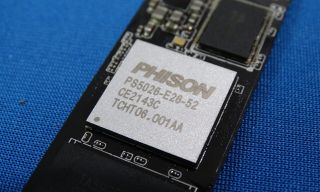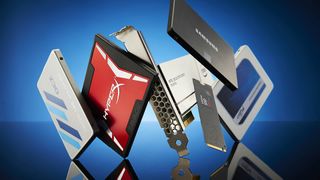No more fans: Phison's new PCIe Gen 5 controller sacrifices raw SSD speed in the name of silence
The new E31T controller promises mainstream PCIe 5.0 SSDs that will still outperform the previous gen but without the need for silly active cooling.

It would be fair to say that PCIe Gen 5.0 SSDs have had a difficult start in life. While Gen 4 drives have become something of a standard in many high-end systems, Gen 5 drives have failed to take off in similar fashion, primarily because for most users the previous generation SSDs bring great real world performance for a much more reasonable price. Beyond the high pricing and limited usefulness for this sort of speed as things currently stand, there's still another rather large elephant in the room: Heat.
However, Phison has announced several new products it'll show off at its CES 2024 booth (via Tom's Hardware), and one controller in particular seems designed to address those pesky thermals.
The snappily titled PS5031-E31T is an M.2 PCIe Gen 5 controller with a maximum sequential read and write speed support of up to 10,800 MB/s. This would put it on the slower end of the scale compared to other PCIe Gen 5 drives, but still a fair bit faster than the theoretical maximum of the PCIe 4.0 x4 speed limit of 7,880 MB/s.
However, because it's designed to operate at lower power and therefore produces less heat, the hope is that it should enable Gen 5 drives to be manufactured without the need for an active SSD cooler. This would open up the technology to be used in compact systems, laptops and handheld devices that don't have the physical space for bulky heat-dissipation methods.
The new controller is built on TSMC's 7nm process, with a 4-channel configuration, ARM Coretex R5 CPU, AES 256 encryption, and Phison's 7th Gen LDPC. It'll support a maximum capacity up to 8TB and both 3D TLC and QLC NAND flash.

Best SSD for gaming: The best speedy storage today.
Best NVMe SSD: Compact M.2 drives.
Best external hard drives: Huge capacities for less.
Best external SSDs: Plug-in storage upgrades.
The second controller announced is another low-power unit aimed at the 2230 form factor M.2 SSDs used in handheld gaming devices like the Steam Deck. The PS5027-E27T is a PCIe Gen 4 controller built on TSMC's 12nm process, and it's rated at a maximum sequential performance of 7,400MB/s for reads and 6,700 for writes.
Phison also plans to demo its PS5026-E26 Max14um Gen 5 SSD controller at CES, and it looks like an absolute performance beast. This isn't the first time we've seen the controller used here under demonstration, and this drive has previously been shown to be capable of over 14,000 MB/s reads and over 12,000 MB/s writes, although with that massive performance comes some serious cooling to deal with all that aforementioned heat.
The biggest gaming news, reviews and hardware deals
Keep up to date with the most important stories and the best deals, as picked by the PC Gamer team.
The test drive is purported to be using two of Frore Systems AirJet Minis to keep itself from throttling, so it'll be interesting to see what sort of noise this SSD makes when it's running at full tilt.
Sabrent has also teased that it will be showing off its Rocket 5 Plus SSDs at the Las Vegas show, which are themselves built around the Phison E26 controller—though we don't know what extravagant cooling solution it's going to be using just yet.
Beating the heat is one thing, but while all this performance looks great on paper it's still difficult to imagine Gen 5 adoption will increase unless prices fall, and given current NAND production difficulties that seems unlikely to happen anytime soon. Regardless, as a demonstration of possible improvements this tech looks impressive, although we'll have to wait until CES 2024 to see it for ourselves.

Andy built his first gaming PC at the tender age of 12, when IDE cables were a thing and high resolution wasn't. After spending over 15 years in the production industry overseeing a variety of live and recorded projects, he started writing his own PC hardware blog in the hope that people might send him things. And they did! Now working as a hardware writer for PC Gamer, Andy's been jumping around the world attending product launches and trade shows, all the while reviewing every bit of PC hardware he can get his hands on. You name it, if it's interesting hardware he'll write words about it, with opinions and everything.
Most Popular






